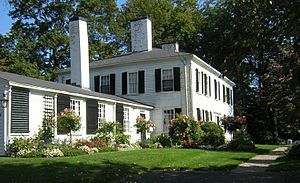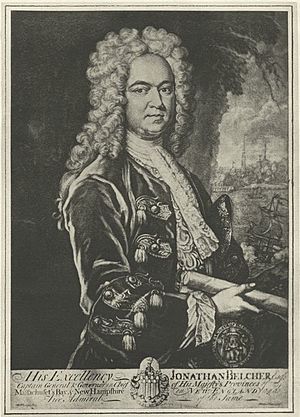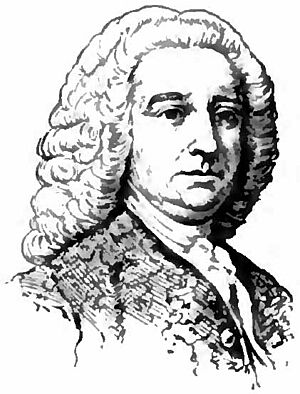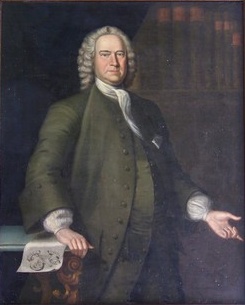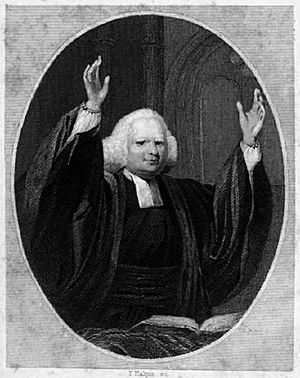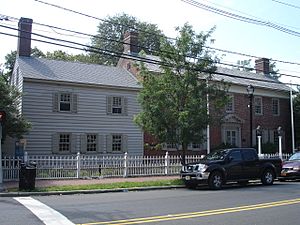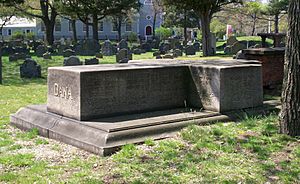Jonathan Belcher facts for kids
Quick facts for kids
Jonathan Belcher
|
|
|---|---|
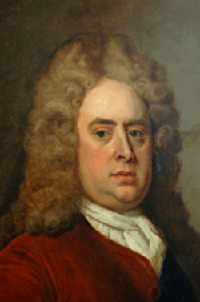 |
|
| Governor of the Province of Massachusetts Bay | |
| In office 10 August 1730 – 7 September 1741 |
|
| Monarch | George II |
| Lieutenant | William Tailer Spencer Phips |
| Preceded by | William Tailer (acting) |
| Succeeded by | William Shirley |
| Governor of the Province of New Hampshire | |
| In office 1730–1741 |
|
| Monarch | George II |
| Lieutenant | John Wentworth David Dunbar |
| Preceded by | John Wentworth (acting) |
| Succeeded by | Benning Wentworth |
| Governor of the Province of New Jersey | |
| In office 1747 – 31 August 1757 |
|
| Monarch | George II |
| Lieutenant | Thomas Pownall |
| Preceded by | John Reading (acting) |
| Succeeded by | John Reading (acting) |
| Personal details | |
| Born | 8 January 1682 Cambridge, Massachusetts |
| Died | 31 August 1757 (aged 75) Elizabethtown, New Jersey |
| Resting place | Old Burying Ground, Cambridge, Massachusetts |
| Spouses | Mary Partridge Belcher Louise Teale Belcher |
| Children | Jonathan Belcher Andrew Belcher |
| Profession | Merchant, politician, slave trader |
| Signature | |
Jonathan Belcher (1682–1757) was an important figure in colonial America. He was a merchant and politician. Belcher served as the governor of Massachusetts Bay and New Hampshire from 1730 to 1741. Later, he became the governor of New Jersey from 1747 until his death in 1757.
Belcher came from a wealthy family in Massachusetts. He studied at Harvard College. After college, he joined his family's business and got involved in local politics. He helped Samuel Shute become governor of Massachusetts in 1715. Over time, Belcher disagreed with Shute and joined another political group.
After Governor William Burnet died in 1729, Belcher successfully became governor of both Massachusetts and New Hampshire. During his time as governor, he made many powerful enemies. He often removed people he saw as opponents from their jobs. In a border dispute between Massachusetts and New Hampshire, Belcher secretly favored Massachusetts. His opponents eventually convinced the Board of Trade in England to replace him.
In 1747, Belcher was appointed governor of New Jersey. He tried to settle arguments between different groups in New Jersey. He also supported the creation of the College of New Jersey, which is now Princeton University. Belcher was ill for much of his time as governor of New Jersey. He died in office in 1757. The town of Belchertown, Massachusetts, is named after him.
Contents
Early Life and Education
Growing Up in Colonial Massachusetts
Jonathan Belcher was born in Cambridge, Massachusetts, on January 8, 1682. He was one of seven children. His father, Andrew Belcher, was a successful merchant and was involved in the slave trade. His mother, Sarah Gilbert Belcher, came from a well-known family in Connecticut.
When Jonathan was seven, his mother died. His father sent him to live with relatives while he grew his trading business. Andrew Belcher became one of the richest men in Massachusetts. To improve the family's standing, Jonathan attended Boston Latin School in 1691. Then, he went to Harvard College in 1695.
Family and Business Connections
In 1706, Belcher married Mary Partridge. She was the daughter of William Partridge, a former Lieutenant Governor of New Hampshire. They had three children: Andrew, Sarah, and Jonathan. Mary died in 1736.
Belcher graduated from Harvard at age 17. He then joined his father's large trading business. This business traded goods from the West Indies to Europe. In 1704, Belcher traveled to London to make business contacts. He also visited the Netherlands and other parts of western Europe. He met important people, including the future King George I of Great Britain. These travels helped him build connections and learn about different cultures.
During the War of the Spanish Succession (also called Queen Anne's War in North America), Belcher's father supplied the colonial military. Jonathan helped manage the family's trading. The war caused economic problems in Massachusetts. The Belcher family, who stored food and supplies, became unpopular when food shortages happened. Mobs sometimes targeted their warehouses. Jonathan was even beaten by a mob once.
Investments and Land Holdings
Belcher's business interests included some involvement in the slave trade. He also owned enslaved people. However, he later wrote that he wished there were fewer enslaved people in the colonies.
The Belcher family owned a lot of land in New England. In 1716, Massachusetts gave land to Connecticut to fix old survey errors. Belcher bought some of these "Equivalent Lands". The town of Belchertown was later formed on some of this land.
Belcher also inherited land in Wallingford and Meriden, Connecticut. He spent a lot of money trying to mine for metals, especially copper, but it was not successful. In 1714, he invested in another mine in Simsbury. Mining copper in the colonies was difficult because British law made it illegal to smelt copper there. This meant the ore had to be shipped to England, which was very costly. He eventually set up an illegal smelting operation.
Political Beginnings and Agent Role
In 1714, when King George I came to power, Jonathan Belcher went to London. He wanted to use his family's connection to the new king. He also recruited German miners for his Connecticut mines.
Colonel Elizeus Burges was chosen as governor of Massachusetts and New Hampshire. Belcher and Jeremiah Dummer paid Burges to resign before he even left England. They then helped Samuel Shute become governor. They thought Shute would be well-liked in New England. Shute arrived in Boston in 1716, and his time as governor was often difficult.
Belcher was elected to the Massachusetts Governor's Council in 1718. He was often in and out of the council because of political struggles. He became unhappy with the influence of Paul Dudley during the time of Acting Governor William Dummer.
When William Burnet arrived as governor in 1728, Belcher was chosen to lead Boston's town meeting. Belcher and Elisha Cooke Jr. worked together during Burnet's arguments with the assembly over his salary. The assembly then chose Belcher to go to London. His job was to explain the colony's side of the salary dispute.
Governor of Massachusetts and New Hampshire
In 1729, while Belcher was in London, Governor Burnet suddenly died. Belcher worked hard to get the job of governor for both Massachusetts and New Hampshire. He succeeded by talking directly to high-level government officials. This made him an enemy of Martin Bladen, a powerful official. When he took the job, Belcher had to support policies he had been sent to London to oppose. This made it hard for him to please both the colonies and London.
Leading Massachusetts
When Belcher arrived in Massachusetts in 1731, he was welcomed. However, he quickly started removing opponents from government jobs. This showed everyone that he would use his power to control politics.
One issue Belcher focused on was defending the established church in Massachusetts. He was a strong Congregationalist. He did not want members of the Church of England to be free from church taxes. He eventually had to allow it in 1735. In 1735, Belcher also helped arrange for Stockbridge Indians to accept Congregationalist missionaries.
Belcher also tried to improve business in Boston. He had seen organized markets in Dutch cities during his travels. He used these ideas to make Boston's markets more orderly. He even named Hanover Street in Boston after the Hanover family, the British royal family.
Governing New Hampshire
Belcher's time as governor in New Hampshire started well but quickly became difficult. He learned that Lieutenant Governor John Wentworth had supported another candidate for governor. In response, Belcher turned against the entire Wentworth family. He allied with Richard Waldron, a rival of the Wentworths. Belcher removed many Wentworths and their allies from their positions.
The Wentworth family was powerful. They were unhappy that New Hampshire shared a governor with Massachusetts. Many resented that a Massachusetts man held the top job. Because of their influence, New Hampshire's assembly was often against Belcher. His opponents even got some of their members appointed to the provincial council. Belcher tried many times to get a friendly assembly by calling for new elections, but he failed.
Belcher was disappointed when David Dunbar became lieutenant governor of New Hampshire in 1731. Dunbar was friendly with the Wentworths. He was also responsible for finding trees for ship masts and stopping illegal logging. Many of Belcher's supporters were involved in illegal logging. Belcher tried to limit Dunbar's power. The two men disliked each other. Dunbar soon began working in London to get Belcher replaced.
Border Disputes and Opposition
Belcher did not want to solve the long-standing border disputes between New Hampshire and Massachusetts. The disputed land was west of the Merrimack River. People from both provinces were fighting over land claims. Belcher secretly favored Massachusetts in these disputes. The border issue eventually went to the highest levels of government in England. New Hampshire's supporters found a strong voice in John Thomlinson, a London merchant. In 1737, he convinced the Board of Trade to create a commission to settle the border. Despite Belcher's efforts to help Massachusetts, the final ruling in 1739 favored New Hampshire.
By 1736, Belcher's many political enemies started working together in London. William Shirley, who wanted a better job, sent his wife to London to lobby for him. She joined forces with Samuel Waldo, a rich lumber businessman. Waldo's contracts with the Royal Navy were hurt by Belcher's support of illegal logging. David Dunbar also went to London in 1737 and provided proof of the logging. These groups, along with Thomlinson, worked to get Belcher replaced. They wanted Shirley to be governor of Massachusetts and Benning Wentworth for New Hampshire.
In 1739, London politics and a money crisis in Massachusetts made things more complicated. Belcher was ordered to reduce the amount of paper money in Massachusetts. This led to different banking ideas in the province. Landowners wanted a "land bank," while merchants wanted a "silver-backed" bank. Belcher could not take sides without upsetting his supporters. He tried to get the assembly to agree on a money plan that London would accept, but he failed.
The British government also declared war on Spain in 1739. Belcher was asked to raise troops from the colonies. He promised more troops than he could deliver. He also refused to approve bills to print money to pay the militia.
Many factors led to Belcher's dismissal. He had made many enemies in the colonies. Also, the British government felt he needed to be replaced for better management. In April 1740, William Shirley was given a chance to prove he could raise troops more effectively than Belcher. Shirley recruited soldiers outside Massachusetts and sent proof of his success to London. In April 1741, the British government approved William Shirley as governor of Massachusetts. Benning Wentworth became governor of New Hampshire in June.
Governor of New Jersey
Belcher was surprised to be replaced by Shirley. He retired to his estate in Milton. In 1743, he traveled to England, hoping to get another colonial job. He spent three years there, connecting with religious communities like the Congregationalists and Quakers. In 1746, the governor of New Jersey, Lewis Morris, died. Belcher quickly got support from the Quaker community in London. He was appointed governor of New Jersey before anyone else could organize their efforts.
He served as governor of New Jersey from 1747 until his death in 1757. In 1748, he married Louise Teale, a widow he met in London. The political situation in New Jersey was very tense. There had been riots over land ownership disputes. Most laws had been stuck since 1744 because the assembly, council, and governor could not agree. New Jersey was also a mix of different cultures and religions. Belcher found a welcoming community in Elizabethtown, which had many evangelical Christians. He attended services there and was influenced by preachers like George Whitefield and Jonathan Edwards.
Belcher's arrival brought some peace, and bills were passed to fund the government. However, disagreements soon returned. Belcher believed land issues should be solved through talks. He tried to stay neutral, but he received little support from either side. The government often lacked money between 1748 and 1751.
One important issue Belcher helped with was the creation of the College of New Jersey, now Princeton University. This college was proposed by Presbyterians, with whom Belcher shared religious beliefs. Other groups had concerns about the college. Governor Morris had refused to grant a charter for the school. After Morris died, an acting governor granted the charter. Opponents pressured Belcher to withdraw it. Instead, Belcher supported the college and added people with different religious views to its board. When the first building was built in 1754, the board wanted to name it after Belcher. But he preferred it be named after King William. So, the building is known as Nassau Hall. Belcher also supported the college's library and gave his own books to it.
The New Jersey legislature remained divided until the French and Indian War started in 1754. The need for military support brought some unity. However, the assembly still objected to increased funding for the militia in 1755. They also complained that meetings were held too often in Elizabethtown because of Belcher's poor health.
For much of his time in New Jersey, Belcher was ill with a progressive illness that caused paralysis. In 1751, he moved to Elizabethtown hoping to improve his health, but it did not. Eventually, his hands became paralyzed, and his wife had to write for him. He died at his home in Elizabethtown on August 31, 1757. His body was taken to Massachusetts and buried in Cambridge.
Family and Character
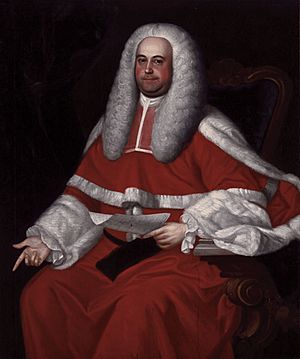
Belcher's youngest son, Jonathan, became the Chief Justice of the Nova Scotia Supreme Court. His other son, Andrew, continued the family business and served on the Massachusetts Governor's Council. Belcher had no children with his second wife, Louise.
Belcher was known for having a difficult personality. Some people said he made divisions worse in New Jersey. He often reacted strongly to challenges to his power. He would try to hurt or sideline his enemies. In private letters, he used insulting names for his opponents. He also pressured newspapers in Boston to write good things about him.
Legacy
The town of Belchertown, Massachusetts, is named after Jonathan Belcher. His home in Elizabethtown, New Jersey, still stands. It is known as the Belcher-Ogden House and is listed on the National Register of Historic Places. His summer home in Milton, Massachusetts, was destroyed by fire in 1776. Parts of it may have survived in the house built by his widow, now called the Belcher-Rowe House.
Burial
When he died, Governor Belcher asked to be buried next to his friend and cousin, Judge Jonathan Remington. Judge Remington's body was moved to be placed beside him. The monument Belcher wanted for his grave was never built. The tomb became the family vault of the Jennisons. For a long time, the exact location of their grave was forgotten. In the late 1800s, historians found that Governor Jonathan Belcher and Judge Jonathan Remington were buried together in the Old Burying Ground in Cambridge, Massachusetts. Their tomb is next to the tomb of Judge Edmund Trowbridge.
Images for kids
 | John T. Biggers |
 | Thomas Blackshear |
 | Mark Bradford |
 | Beverly Buchanan |


